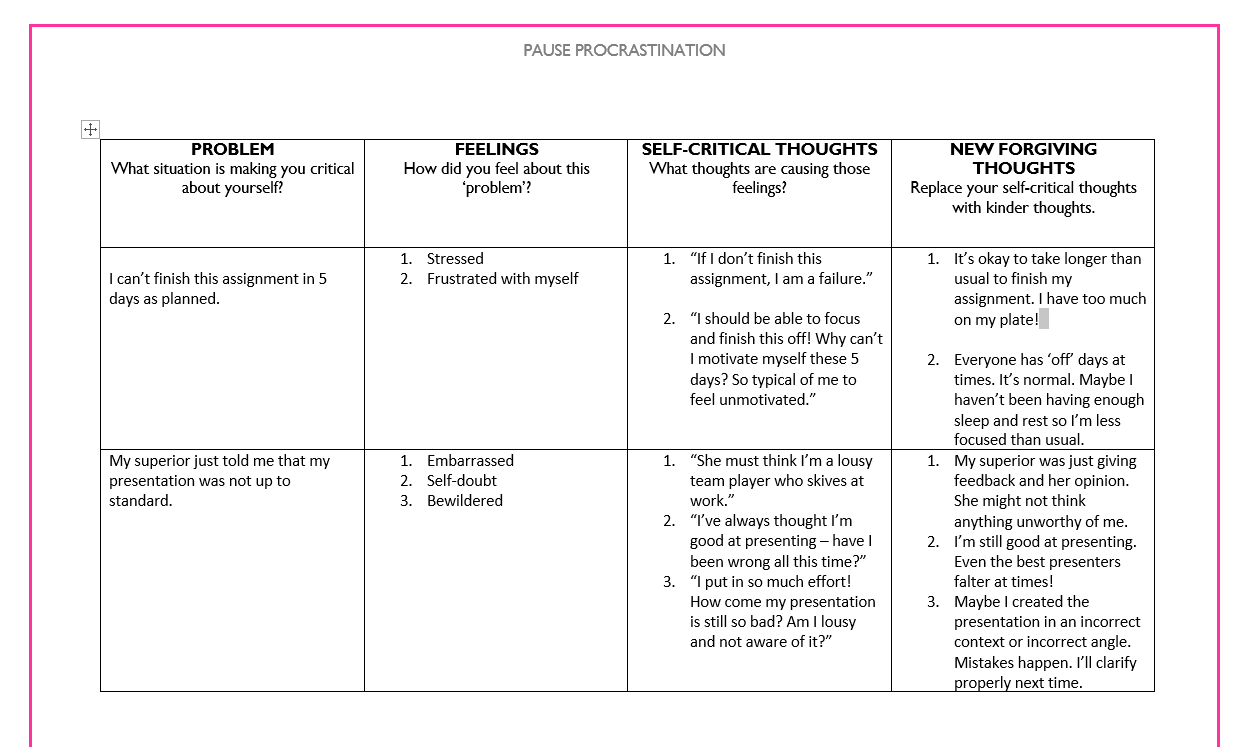Today we’re featuring a guest post by Shikah Anuar, creator of SelfCareNotes
I’m Shikah and I used to have a 9-6pm job as a counsellor. I like sharing practical self-help advice for women. I’m here to help you lead a more smooth-sailing and happier life. You can find me here: Instagram | Facebook
(PS: There is a FREE Pause Perfectionism Worksheet I created for you at the end of this post. Look out for it!)
I remember the time when my superior walked up to me and said, ‘I expected your presentation to be different.’I was working in a government ministry as a counsellor at that time. Her eyes showed some disappointment.
I felt a churning in my stomach. I hated doing presentations back then (I’m better with them now) and my perfectionist, overthinking streak made it worse, I’m sure.
My superior expected me to be more engaging. And also to do the whole presentation by myself. Preferably without sticking strictly to a script.
I was kicking myself and felt so embarrassed. I thought my content was good! (It probably was). Self-doubt clouded my mind. Maybe I was not as good as I thought I was?
If you are a perfectionist, this last question can literally kill your spirit. (Half-joking)
‘Perfection is a fairy tale.’ Perfectionists have a fear of failure and low self-esteem.
It is caused by the constant negative chatter in the mind.
We will make mistakes at work. We will make colleagues and clients angry at times. We will be given ‘feedback’ because our work is not considered up to par according to others. It’s part of working life.
Don’t beat ourselves over it.
If you have a few of the 6 signs below, you might be a tad perfectionistic. It’s okay to admit that! The first step to helping yourself is admitting that you have an issue.
(Everyone has issues, anyway)

6 Obvious Examples of Perfectionism at Work
Procrastination
For example: “I don’t have all the numbers and reliable research necessary to start that project. I’ll wait till I have everything at hand. Then I’ll start.” Coupled by a feeling of resistance to start the project because you are so overwhelmed by the details you think you need.
Critical of others
For example: “I can’t believe this guy – who doesn’t even have a degree – is conducting a presentation to my students. It’s a free presentation, yes, but can’t the school choose someone more credible?”
Obsessing over small decisions
For example: “I think the formatting of my project is not right. The font size is not ideal. Actually, I think the font itself does not give the right ‘feel’. The pictures I used are not good enough. A marketing coach once said that the pictures we choose have to evoke emotion in readers. I’m going to quickly search for pictures which evoke emotion. Oh, and the other copywriting coach said the headline of an article or project has to contain a number to grab the readers’ attention. Let me quickly go through his Powerpoint slides again to refresh what he said…” (you get the drift)
Anxiety
For example: Getting mild panic attacks which feel like a shortness of breath, a pounding headache, cloudy mind, heartbeat quickening.
Black-and-white thinking
For example: “If I can’t prepare this (voluntary) presentation properly, might as well not do it. If I want to share and conduct a presentation – even if it’s voluntary – it must be done properly. People do not attend this presentation to hear someone explaining basic info. Or see someone faltering and fumbling in front of an audience. They want to get the best info. So my presentation has to be extremely valuable.”
Other people saying that you ‘think too much’ or have ‘high expectations’
Don’t brush off others’ comments about you! If you get a few people telling you that you overthink, over-worry, or have unrealistic expectations, you can start taking note. Be open-minded that you might have an issue. Don’t be the person who cuts other people out of her life just because they said something critical about you.
4 Step-by-Step Actions to Kill the Perfectionist Mindset at Work
Intense negative thoughts cause perfectionism. So, to tweak perfectionism, we need to tweak our thoughts.
Not to worry, I’ve created a Pause Perfectionism Worksheet to make it easier for you.

The above is an example of how to complete the Pause Perfectionism Worksheet.
You can download the Pause Perfectionism Worksheet below.
There are 4 sections in this worksheet and each section requires action from you.
Action Step 1: Pinpoint the Problem
What is the situation causing you to be self-critical?
Your boss telling you that your work is not good enough?
Your client tells you that you’ve made a mistake?
Your colleague telling you that you are not working hard enough?
You were told off at a meeting?
You could not answer a question directed at you during a meeting?
Your colleagues laughing or being critical of your idea during a meeting?
Action Step 2: Acknowledge your Feelings about the situation
Be honest with yourself. (Don’t be in denial.)
Write down in the Feelings column if you feel ashamed, angry, hurt, vulnerable.
Some of us feel uncomfortable admitting that we feel ashamed and hurt.
If so, ask yourself: why am I uncomfortable admitting that I feel hurt/ embarrassed/ like a failure?
Is it because you think admitting to your feelings is a sign of weakness?
On the contrary, it takes strength to be vulnerable in front of others and risk being seen as a wimp.
Action Step 3: What Self-critical Thoughts are causing those feelings?
Feelings are controlled by thoughts.
If you can reframe your thoughts, you can change your feelings. It sounds simple, but it’s not easy to do.
You have to dig deep and identify your perfectionistic thoughts linked to your feelings. Write those self-critical thoughts in the Self-Critical Thoughts column.
For me, I’ve always linked mistakes with being useless.
As an Asian, trust me, I was brought up thinking we have to be productive every single minute.
I hated being ‘useless’ or a deadweight anywhere.
I’ve come a long way in embracing my own self-worth and realizing that being emotionally present alone or giving your loved ones support can do SO MUCH for their well-being.
You don’t have to earn a lot of money or toil away all day (especially at a job you hate) just to justify your existence.
But that’s another topic for another time.
Action Step 4: Replace those self-critical thoughts with New Forgiving Thoughts
Looking at matters from a big perspective helps.
If your boss said your presentation sucked, it could be that you were distracted by things happening in your personal life. Thus, you were not focused at work.
Or maybe you did a shoddy job because you were too busy to prepare the presentation at length. You said ‘yes’ to too many requests and had too much on your plate.
It’s not because you are incompetent!
Or maybe…your boss was not in a good mood that day. 😉
Create new self-loving thoughts to replace those self-critical ones.
You should feel lighter, breathe easier and feel calmer after embracing those new forgiving thoughts.
What is the ideal transformation for a perfectionist?
We are striving to enjoy the process instead of just achieving goals and outcomes. Delegate your work, chores, and errands if you can. Trust that other people can help you do the work as well as you can – if not better than you.
Ask for help when you need it – admit that we can’t do it all (and shouldn’t) for the sake of our mental health.
Set goals which are fluid. Don’t set rigid and set-in-stone demands on yourself because circumstances – and even people – change. Might as well be flexible and adaptable. You’ll feel more relaxed.
And you’ll perform better at work when you are relaxed (difficult to believe, yes?).
We also hope to recover easily from mistakes and not beat ourselves up for a mistake we made many years ago (which other people probably don’t care or don’t remember).
To help you transform and be less harsh on yourself at work, you can download the Pause Perfectionism Worksheet I’ve prepared below.
Hope it helps!
